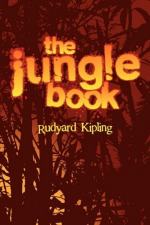Sea Catch sunk his head proudly between his fat shoulders and pretended to go to sleep for a few minutes, but all the time he was keeping a sharp lookout for a fight. Now that all the seals and their wives were on the land, you could hear their clamor miles out to sea above the loudest gales. At the lowest counting there were over a million seals on the beach—old seals, mother seals, tiny babies, and holluschickie, fighting, scuffling, bleating, crawling, and playing together—going down to the sea and coming up from it in gangs and regiments, lying over every foot of ground as far as the eye could reach, and skirmishing about in brigades through the fog. It is nearly always foggy at Novastoshnah, except when the sun comes out and makes everything look all pearly and rainbow-colored for a little while.
Kotick, Matkah’s baby, was born in the middle of that confusion, and he was all head and shoulders, with pale, watery blue eyes, as tiny seals must be, but there was something about his coat that made his mother look at him very closely.
“Sea Catch,” she said, at last, “our baby’s going to be white!”
“Empty clam-shells and dry seaweed!” snorted Sea Catch. “There never has been such a thing in the world as a white seal.”
“I can’t help that,” said Matkah; “there’s going to be now.” And she sang the low, crooning seal song that all the mother seals sing to their babies:
You mustn’t swim
till you’re six weeks old,
Or
your head will be sunk by your heels;
And summer gales and
Killer Whales
Are
bad for baby seals.
Are bad for baby seals,
dear rat,
As
bad as bad can be;
But splash and grow
strong,
And you can’t
be wrong.
Child
of the Open Sea!
Of course the little fellow did not understand the words at first. He paddled and scrambled about by his mother’s side, and learned to scuffle out of the way when his father was fighting with another seal, and the two rolled and roared up and down the slippery rocks. Matkah used to go to sea to get things to eat, and the baby was fed only once in two days, but then he ate all he could and throve upon it.
The first thing he did was to crawl inland, and there he met tens of thousands of babies of his own age, and they played together like puppies, went to sleep on the clean sand, and played again. The old people in the nurseries took no notice of them, and the holluschickie kept to their own grounds, and the babies had a beautiful playtime.
When Matkah came back from her deep-sea fishing she would go straight to their playground and call as a sheep calls for a lamb, and wait until she heard Kotick bleat. Then she would take the straightest of straight lines in his direction, striking out with her fore flippers and knocking the youngsters head over heels right and left. There were always a few hundred mothers hunting for their children through the playgrounds, and the babies were kept lively. But, as Matkah told Kotick, “So long as you don’t lie in muddy water and get mange, or rub the hard sand into a cut or scratch, and so long as you never go swimming when there is a heavy sea, nothing will hurt you here.”




